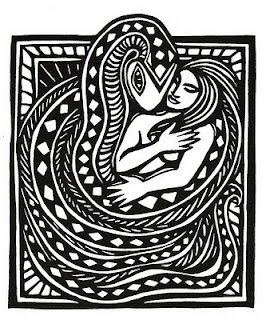The Apple in the Garden - Genesis 3
I encourage you to read Genesis 3:1-18 along with your reading of this blog. Find the NRSV translation of this passage here!
We have begun our study with the pre-history in the book of Genesis. We have looked at and heard the first creation account in chapter 1 – God is the creator of the universe; and the 2nd creation account in which God creates humanity – man and woman together – and gives them community, environment which brings with it permission to use the garden to sustain life, a prohibition to avoid the Tree of the Knowledge of Good and Evil as the consequence will be the ending of life; and it brings with it the vocation of caring for the creation, of being co-creators, of taking responsibility.
Today we focus on Chapter 3. The cunning serpent suggests to Eve that there would be no consequences for disobeying God and that if she and Adam eat of the fruit then there will be no more need of God, for they can be like God themselves. In other words, they could stage a coup and take on the power of the creator for themselves. The temptation is too great. Both Eve and Adam eat of the fruit. But there are consequences. Life is threatened. But again God, the creator steps in protects the humanity. Life is saved, but there are consequences. Humanity is banished from the garden, there is work and toil and child-birth – and blessing even in the midst of this fall. As we learned in creation #1 God is always at work creating – bringing good from evil and life from death.
The Sin of Adam and Eve is not disobedience (that is only a small part) – it is placing themselves in the center of the universe – it is in wanting to be God and to replace God with themselves. We are still guilty of this. This is the human condition, it is this that we confess each week at the beginning of our liturgy. We want to be in charge and this is manifest by our abuse of the creation, our re-making God in our own image, our arrogance in assuming that God’s priorities are our priorities, our exclusion and rejection of those who are different from us, despite the fact that we are all God’s beloved children. Like Adam and Eve we find that we are not prepared to accept the consequences which always come from our Sin.
Finally, there is a tradition which goes back to the middle ages of understanding the Sin of Adam as a blessing. From the Easter Vigil Exultet: “O necessary Sin of Adam that is wiped away by the death of Christ.” And the text for the Medieval Advent Carol Adam Lay Ybounden concludes with these words: “Had not the apple taken been, never had our Lady been heaven’s queen. Blessed be the time the apple taken was. Therefore may we sing: Deo Gracias (Thanks be to God!). Here in these ancient texts is one of the great proclamations about God creator: God is the best improviser ever; God can bring good from evil, light from darkness and life from death! The Sin of Adam and Eve is the sin of us all – we want to be God – we want to be in control. The result is pain and suffering and death – but from this God brings life through the resurrection of Jesus. God brings forth a New Creation from the dust and ashes of our Sin because of Christ. “Therefore may we all sing: Deo Gracias – THANKS BE TO GOD!”
Bibliography - "Genesis - Translation and Commentary" by Robert Alter. This is a wonderful translation. This is the translation I am using at Peace.
Also see Walter Bruggemann's Interpretation commentary on Genesis; Bill Moyer's conversations about Genesis and Gary Rendsburg's lectures on Genesis (available through "The Teaching Company")



Comments
Post a Comment